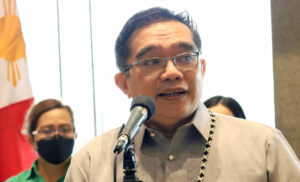Dennis Marasigan’s return to the CCP
The new artistic director will have to navigate bureaucracy and a major renovation IT WAS Nov. 2 and the beginning of another regular work week. For Dennis N. Marasigan, it was his first day back in an office at the Cultural Center of the Philippines...

The new artistic director will have to navigate bureaucracy and a major renovation
IT WAS Nov. 2 and the beginning of another regular work week. For Dennis N. Marasigan, it was his first day back in an office at the Cultural Center of the Philippines (CCP) after 16 years. This time, as its new vice-president and artistic director.
Sitting on his worktable was a printed copy of the open letter sent by his predecessor, Chris B. Millado. The letter opens with: “Dear Colleague, ‘Break a leg!’ for taking on what could be the best arts management post in the country. I wish you the most fulfilling time as you immerse in the hundreds of arts-related activities during your tenure.”
In mid-September, Mr. Marasigan received a call from CCP President Maria Margarita “Margie” Moran-Floirendo. She asked him if he was interested in becoming the CCP’s new artistic director.
“I thought the phone call was about [the opera] Turandot because I had been asked to be the production manager for it,” Mr. Marasigan told BusinessWorld in an interview via Zoom. “My first reaction was to laugh… I wasn’t thinking about it.”
After he was given time to think about the offer and talk to his family, Mr. Marasigan filed his application and officially assumed the post a month later.
Mr. Marasigan admitted that it felt “a little weird” to be back in the CCP offices.
He first worked at the CCP from July 1989 to September 1994 as division chief for technical services. In October 1994, he became assistant vice-president and department manager for theater operations, a post he held until February 1997. He then became the artistic director-department manager for the performing arts, twice — from March 1997 to July 1998, and again from June 2000 to August 2001. Finally, he served as department manager for marketing from August 2001 to November 2006.
Since then, he worked on occasional projects at the CCP.
As a creative, Mr. Marasigan is an actor, director, lighting designer, and producer. He is also the theater arts program head at the Meridian International Business, Arts and Technology College (MINT College).
A NEW ROLE
His first day at work two weeks ago was focused on meeting with familiar and new staff and finding out what he needed to know about their respective tasks, and what his job would be like.
“The first thing that I suppose that I need to brush up on is just to figure out how the CCP bureaucracy works,” Mr. Marasigan said. “I’ve been trying to figure out and find out the plans of the CCP.
“The most immediate is that the building is going to be closed for at least three years. And that means that we will have to rethink the way we implement our projects and programs for the next couple of years,” he said.
During the three-year renovation, the CCP’s productions and program will have to be held in other spaces in Metro Manila.
In a podcast with BusinessWorld, CCP Department Manager Administrative Services Teresa “Tess” S. Rances said that the performances of the resident companies and some workshops will transfer to the Metropolitan Theater in Manila. Some will be held at the new Samsung Performing Arts Theater in Circuit Makati.
The newly launched Tanghalang Ignacio Gimenez or Black Box Theater — a venue that is separate from the main CCP building — will see performances by Tanghalang Pilipino (TP), and screenings for the Cinemalaya International Film Festival.
“It gives us again the flexibility to do these performances and events outside of the center and reaching not the usual regular participants that we have if it were to here at the CCP complex,” Mr. Marasigan said of the building closure.
His focus, at the moment, is managing his transition and reorienting himself with the programs for next year before implementing new ideas.
“I [want to] find out why things are being done, and perhaps after that also talk to the stakeholders and ask them if they think that the CCP is addressing their needs or their concerns,” he said.
Aside from his new role, Mr. Marasigan will also be directing the rerun of Tanghalang Pilipino’s Ang Pag-uusig as part of the CCP resident theater company’s 36th performance season in April 2023 — a play he also directed in 2017 and 2018. His recent directorial stint with the theater company was the filmed restaging of Layeta Bucoy’s Doc Resurreccion: Gagamutin ang Bayan in April this year.
Because of his new position, his teaching load as a professor will be reduced, and schedules in film production will have to change.
UPHOLDING ARTISTIC FREEDOM
After reading the physical copy of Mr. Millado’s open letter, Mr. Marasigan said: “I called him right away. He wished me well and I asked him about his experience.”
Mr. Millado, who was also his batchmate at the University of the Philippines, had also worked at the CCP before returning in 2001 as Associate Artistic Director for Performing Arts.
“He replaced me because I had been moved to Assistant Vice-President for Marketing,” said Mr. Marasigan. “The quaint thing about my having to succeed him also means that I have very large shoes to fill.”
Towards the end of his open letter, Mr. Millado wrote that he hopes for the new artistic director will uphold artistic freedom.
“The responsibility of protecting and defending the constitutional right to freedom of expression of the artist and cultural worker continues to be paramount and central to your job as a civil servant. It is the historical imperative of your office and the teams under you to protect and defend this democratic space if needed.” (Link to the open letter: https://coverstory.ph/an-open-letter-to-the-next-ccp-artistic-director/)
Mr. Marasigan believes in this. “I believe that the arts have a function beyond entertainment. The arts can serve as a function of helping educate and serve as a mirror to society,” he said.
“While not every artist believes in that and not every artist needs to do that, but for artists to be able to create works of art that can really affect the lives of people, then there has to be artistic freedom,” he said. — Michelle Anne P. Soliman























